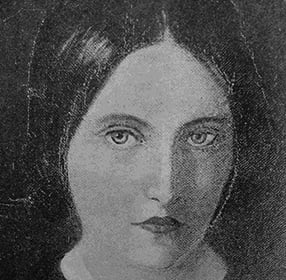On the Wing
Once in a dream (for once I dreamed of you)
We stood together in an open field;
Above our heads two swift-winged pigeons wheeled,
Sporting at east and courting full in view:—
When loftier still a broadening darkness flew,
Down-swooping, and a ravenous hawk revealed;
Too weak to fight, too fond to fly, they yield;
So farewell life and love and pleasures new.
Then as their plumes fell fluttering to the ground,
Their snow-white plumage flecked with crimson drops,
I wept, and thought I turned towards you to weep:
But you were gone; while rustling hedgerow tops
Bent in a wind which bore to me a sound
Of far-off piteous bleat of lambs and sheep.
This poem is in the public domain. Published in Poem-a-Day on June 9, 2024, by the Academy of American Poets.
“On the Wing” appears in Poems of Christina Rossetti, chosen and edited by William M. Rossetti (Macmillan and Co., 1904). In Women Writing and Writing about Women (Routledge, 1979), edited by Mary Jacobus, the chapter “The Indefinite Disclosed: Christina Rossetti and Emily Dickinson,” professor emerita of English at the University of Southampton, Cora Kaplan, analyzes the two poets, stating: “Christina Rossetti’s verse offers up the dream-scene as fantasy in bursts of rich sensuous confusion. Emily Dickinson only rarely uses indirect or ‘permissive’ forms when she wishes to project sensuous or lascivious images.” Kaplan expounds on Rossetti’s “On the Wing,” affirming, “As in Goblin Market [sic], the speaker is careful not to confuse punishment (the loss of ‘life and love and pleasures new’) with guilt, which remains deliberately unassigned. The poem contains a series of highly condensed visual images in which the supposed lovers are both participants and witnesses of a roughly sketched primal scene, but one which contains prelapsarian innocence too. The hawk is the agent of vengeance for the ‘open,’ ‘full in view’ courting in which birds and bird-watchers are engaged. Caught in the act by father, fate, authority, the birds are too ‘weak’ and too ‘fond’ to fly. Death and lost virginity mingle in the crimson drops on white plumage. […] No sexual or social transgression is implied by the words of the poem, so that we have no means of connecting the traumatic scene in the air with the history of loss attributed to the dreamer. Dreamer and lover remain in a metonymic relation to the pigeons and hawk; unspecified, incomplete.”

